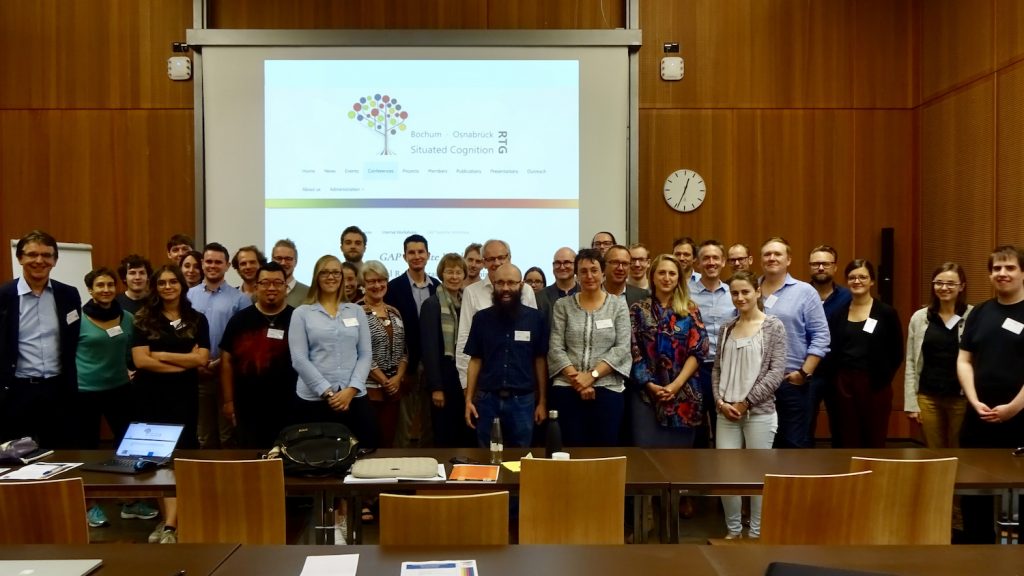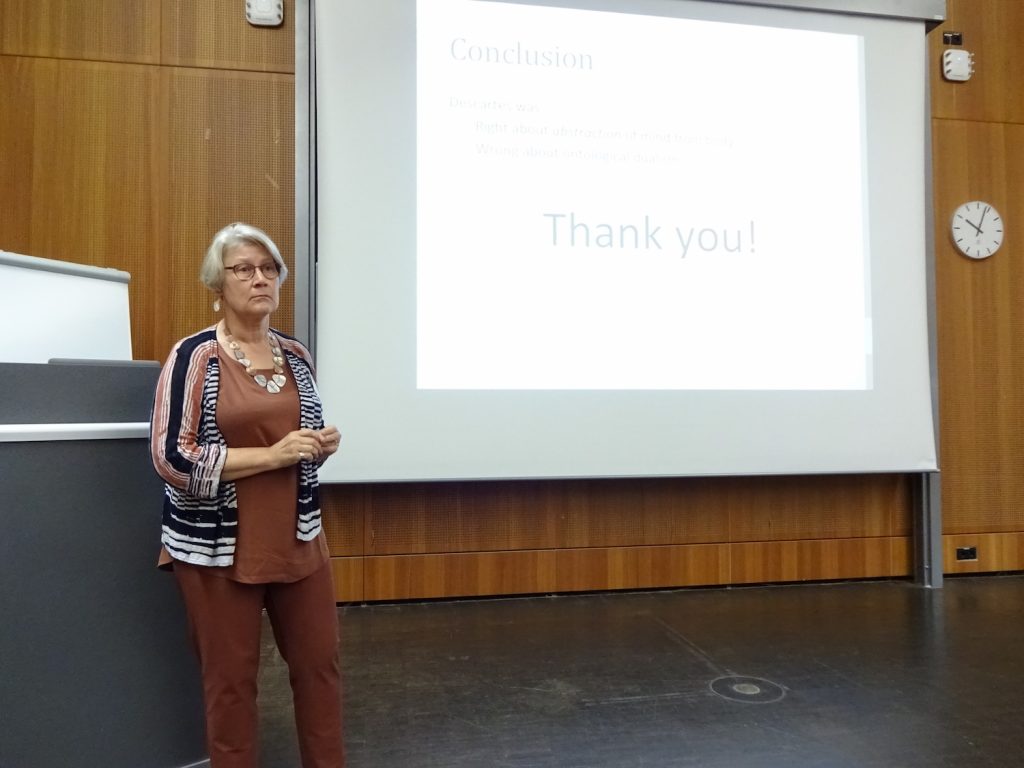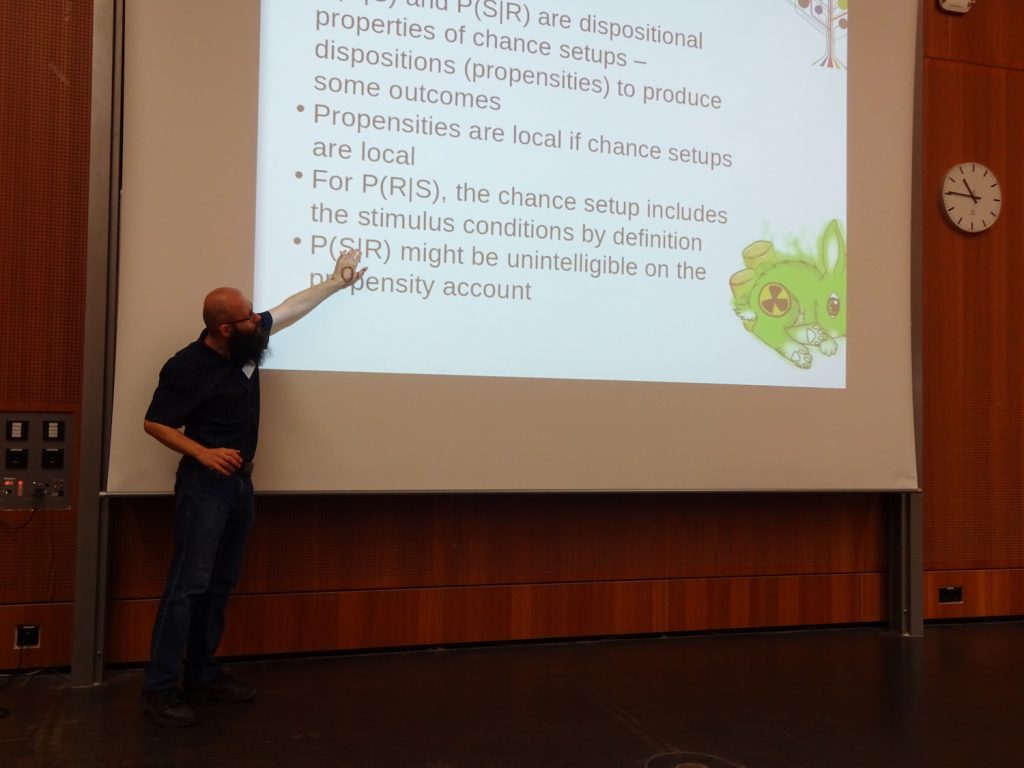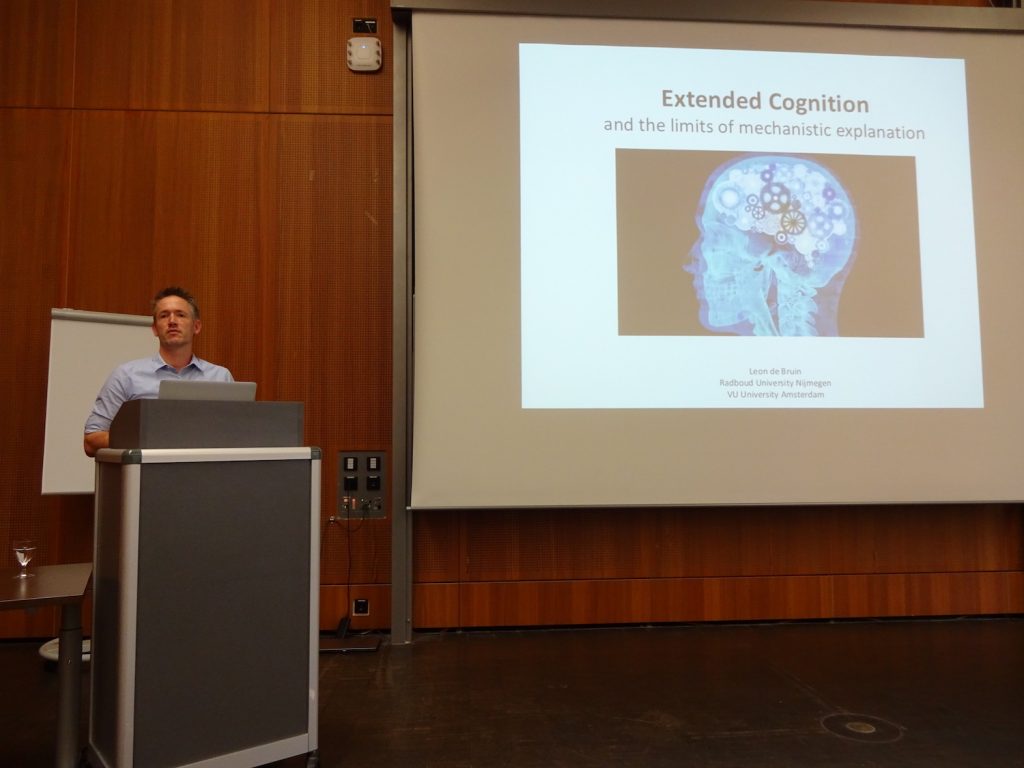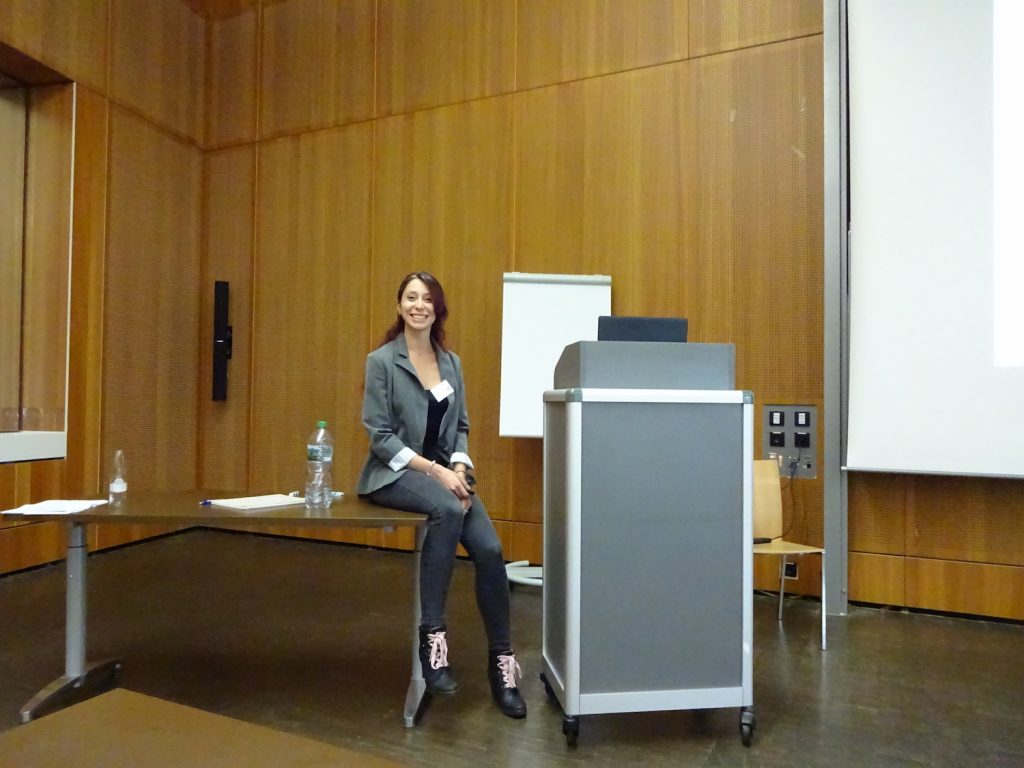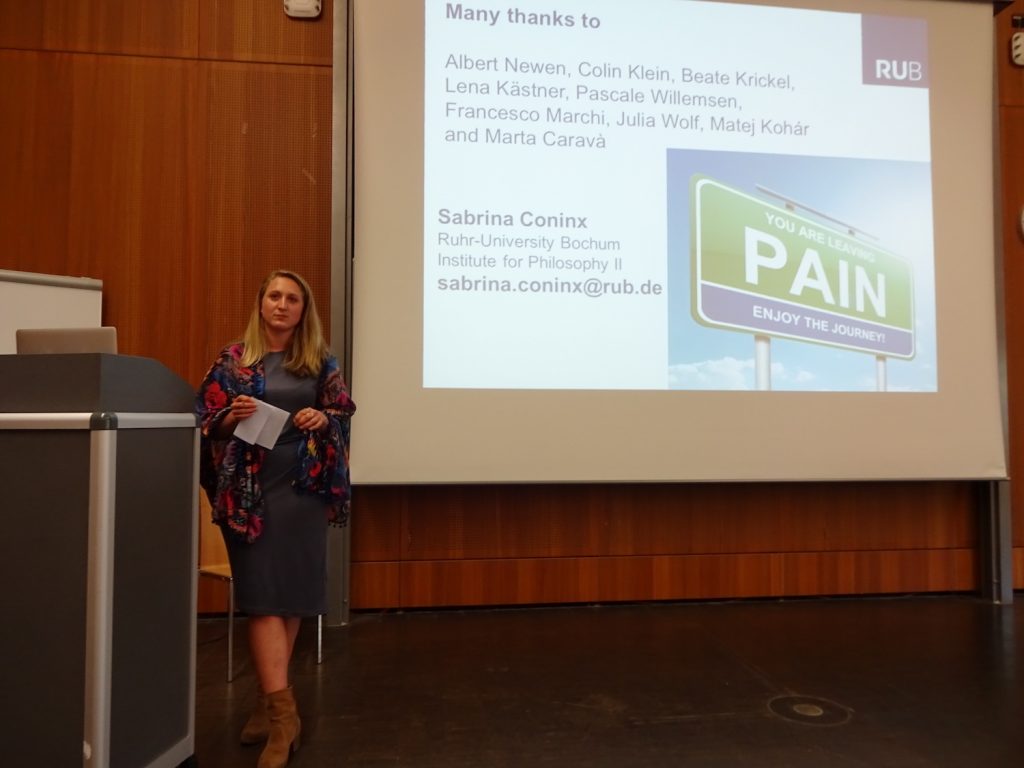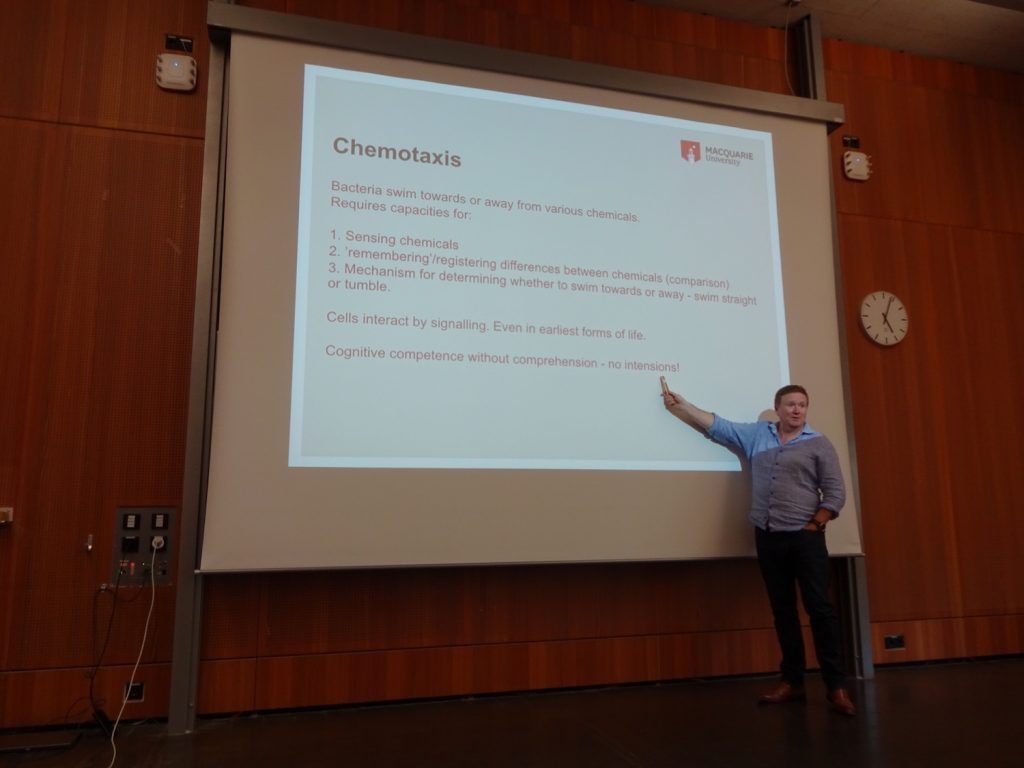
Equality Measures and Career Guidance
Summer School
Recent Developments in Situated Cognition
– Empirical and Philosophical Investigations –
23. – 26.09.2019
Ruhr-University Bochum, Zemos
Download the full summer school programme here
The summer school aims to provide state-of-the-art scientific and research-oriented training on recent developments in situated approaches to cognition in various research fields such as philosophy, psychology, and neuroscience. We invite highly promising doctoral students and early postdoctoral researchers from European and overseas universities and research institutions. The open and constructive setting provides an opportunity for networking, which is complemented by intensive discussions and interactions with leading experts and fellow students.
Confirmed keynote speakers (alphabetical order)
Olaf Blanke (Neuroscience, EPFL Lausanne, Switzerland)
Shaun Gallagher (Philosophy, University of Memphis, USA)
Autumn Hostetter (Psychology, Kalamazoo College, USA)
Fiona Macpherson (Philosophy, University of Glasgow, Scotland)
Gabriela Markova (Psychology, Universität Wien, Austria)
Nicholas Shea (Philosophy, King’s College London, UK)
Thomas Staufenbiel (Psychology, Universität Osnabrück, Germany)
Further speakers (alphabetical order)
Peter Brössel
Onur Güntürkün
Mark James
Matej Kohár
Peter König
Beate Krickel
Jutta L. Mueller
Kathryn Nave
Julian Packheiser
Michael Pauen
Sabine Seehagen
Ric Sims
Basil Wahn
Sven Walter
Call for papers and posters
We invite applications from PhD students and post-doctoral researchers for poster presentations and a few contributing talks. Accepted presenters who do not have their own institutional funding will receive support: 150 Euros for those based in Europe and 250 Euro for non-EU students or researchers. This support will be limited to 20 persons (to be decided after acceptance).
How to apply?
Applicants are asked to submit the following until June 15 (notification of acceptance in late June):
Completed online application in EasyChair by uploading one PDF file containing:
- a statement of interest/motivation (not more than 300 words)
- CV, including a list of publications (if applicable)
- an abstract of 500-700 words summarizing the presentation with a statement whether the application is for a poster, a talk, or both
Tuition is free, thanks to the DFG-Graduiertenkolleg/Research Training Group “Situated Cognition” located at the Ruhr University Bochum and the University of Osnabrück.
Organized by members of the RTG “Situated Cognition”: Albert Newen (Bochum), Beate Krickel (Bochum), Achim Stephan (Osnabrück), Peter König (Osnabrück)
Contact: rtg-situatedcognition@rub.de
Download Call for Papers – extended deadline
Accommodation and travel
Travel recommendations
Bochum Central Station is served by ICE, IC, EC, regional and suburban trains at a high frequency. From there, you can reach the University easily by taking underground line U35 straight to the stop Ruhr-Universität. The U35 (direction Bochum Hustadt) runs at five-minute intervals on weekdays and takes just ten minutes to get to the university.
Travel recommendations for long-distance and air travellers
Four airports – Dortmund, Münster/Osnabrück, Cologne/Bonn and Düsseldorf – are within a reasonable distance of the Ruhr-Universität. Düsseldorf Airport, however, is not only the largest, but also the most easily accessed: there are direct connections between the airport and Bochum’s main train station up to eight times per hour, and the journey only takes a good half an hour.
Travel recommendations for car drivers
Motorists can also easily reach the Ruhr-Universität via the dense network of motorways in Germany and especially in North Rhine-Westphalia. The quickest route is via the motorway junction Bochum/Witten, where the A43 and A44 meet. Simply take the exit Bochum-Querenburg, follow the signs to the “Ruhr-Universität” and then the (electronic) information boards. Free parking is sign posted.
Accommodation
- Kolpinghaus Gaststätte GmbH Bochum | Maximilian-Kolbe-Str. 14-18 | 44793 Bochum | Phone: (+49 234) 60190 |
Fax: (+49 234) 65 8 52 | hotel-kolpinghaus-bochum (at) arcor.de - Ibis Hotel Bochum Central | Universitätsstrasse 3 | 44789 Bochum | Phone: (+49 234) 33311 | Fax: (+49)234/3331867
- Ibis Hotel Bahnhof Bochum | Kurt-Schumacher-Platz 13-15 | 44787 Bochum | Phone: (+49 234) 91430 |
Fax (+49 234) 68077 - Hotel Aleo Nordring 30 | 44787 Bochum | Tel (49 234) 588380 | Fax (+49 234) 5883829 | info@hotel-aleo.de
A good overview for B&B-offers can be found on the following Sites:
http://bedandbreakfast.de/bochum/index.php?lang=en
http://www.bedandbreakfastruhr.de/
Second Conference of the RTG
Situated Approaches to Social Understanding, Emotion, and Meaning
22.06., 09:30 h – 23.06.2018,13:45 h
Ruhr-University Bochum (Room GA 04/187)
Keynote speakers:
Elizabeth S. Spelke (Psychology, Harvard)
Giovanna Colombetti (Philosophy, Exeter)
Barbara Kaup (Linguistics, Tübingen)
Further speakers:
Alexander Bergs (Osnabrück)
Judith Martens (Bochum)
Albert Newen (Bochum)
Achim Stephan (Osnabrück)
Markus Werning (Bochum)
Call for papers & posters (extended deadline)
We invite the contribution of papers and posters on the topics of situated approaches to social understanding, emotion, and meaning, and on the topic of situated cognition in general.
Submissions for paper presentations should consist of an abstract with no more than 1000 words. Submissions for a poster presentation should consist of either an abstract with no more than 600 words or a poster.
Please submit your paper, poster or abstract in EasyChair, indicating in the submission title if it is meant to be a poster presentation (note “poster only”), a paper (note “paper only”) or a paper that might also be considered for a poster presentation (note “paper or poster” – Submitted papers thus marked may be considered also for poster presentations should the maximum number of papers have already been accepted).
The extended deadline for submissions is 23rd May 2018.
Authors of accepted papers or posters are eligible for financial travel support. On the basis of actual expenses and original receipts, travel reimbursements can be claimed after the conference: up to 100 Eur by participants from Germany, up to 150 Eur by participants from other European countries and up to 200 Eur by participants from Non-EU countries (overseas).
In order to register for the conference, please send an email to rtg-situatedcognition@rub.de
Travel information for Bochum visitors
First Conference of the RTG
Linguistic Understanding and Emotion
05.-06.10.2017, University of Osnabrück

On the 5th and 6th of October 2017, the first conference of the DFG research training group (RTG) “Situated Cognition” was held in Osnabrück.
The first day was opened by two PhD students, who reported their progressing work and afterwards were given feedback by the audience. Matej Koher presented a paper where he suggests that explanations in cognitive science have wrongfully combined mechanistic decomposition with the representational theory of mind. He argues that these two accounts are incompatible. Afterwards Jumana Morciglio showed her advancements in her integrative theory of self-control and embodiment extending the traditional “cognitivist” view. Especially chronically weak-willed agents could profit including the body to self-control strategies, which are easier to train than habits. For example embodying certain emotions (e.g. pride) may provide a cognitive short cut to help people stick to their better judgements.

After two talks, which were strongly embedded in the situated cognition framework, Liuba Papeo from the Institute of Cogntive Sciences at the Université de Lyon presented her empirical findings as a counter opinion, arguing for a weaker notion of embodiment. Based on her research with brain damaged patients, she and her colleagues found evidence that patients with motor dysfunction are still able to comprehend the meaning of an action word. This effect cannot be explained by situated approaches and constitutes a problem affecting the core ideas of this framework. These results should find consideration in our underlying paradigm. Her talk was commented by the PhD student Samuel Cosper, who summarised her presented findings, emphasising that the motor cortex is sensitive and that the semantic representation may not reside within the cortex itself, but rather that the cortex itself serves a mediated/secondary function.

After fruitful discussions based on conceptual opposing views of the different talks during the day, debates were continued at the more relaxed atmosphere of the Asian fusion restaurant coa in Osnabrück.
On the second day, continuing with the theme of emotions, Andres Sanchez Guerrero, an associated postdoc of the RTG from the Münster University Hospital (UKM) introduced an account of situated dispositional structures in early childhood. The aim of his project is to combine approaches of the psychodynamic structure with the paradigm of developmental psychology and the situated cognition theory into one framework, bringing it back to clinical practice. Developing a new theory including the first years of life he wants to expand the age range of the OPD-CA-2 (Operationalized Psychodynamic Diagnosis in Childhood and Adolescence) to infancy as well.
Subsequently, the PhD student Elmarie Venter introduced her work on predictive coding, perceptual content and the experiencing subject, exploring the accuracy conditions for a model of the world in the predictive coding framework. She proposed that any analysis of perception in terms of predictive coding will remain incomplete if the self-as-subject is not explained.
Andrea Scarantino, from Georgia State University, was invited for a talk about his motivational theory of emotion, which holds that emotions are essentially irruptive and prioritized impulses to behave. He argued that emotions can help self-control by virtue of how they motivate, feel and evaluate the self and their contribution to setting and shielding distal goals from proximal ones mirrors cognitive habits of self-control. The PhD student Lasse Bergmann summarised this talk and raised the question whether emotions really can be brought into line with goals as suggested by Scarantino.
The PhD student Julian Packheiser started the neurophysiological block arguing that single-unit recordings provide insights into the mechanism of how cognition is organized and realized. Based on first data he concluded that cognitive processes are most likely not structured in a spatially and temporally linear pattern, but rather achieved through feedback processing and neural coupling between perception and action depending on task complexity.
Last but not least Onur Güntürkün from the Ruhr-University Bochum presented the reasons why cognitive performances of birds were underestimated for more than 100 years. Birds, especially pigeons, crows and parrots, are able to act on the same level of cognition as mammals although the structure of the brain is fundamentally different, as birds do not have a cortex. This is possible due to more tightly packed neuronal areas in the brain. He closed his talk stating that different organised brains can produce the same cognitive output.
All together this conference was a great opportunity and inspiration for the continuing work of the RTG. We are looking forward to continue with these stimulating discussions in the upcoming conference on the 15th of December 2017, hosted by the Ruhr-University Bochum, where the remaining PhD students present their projects.
More pictures:
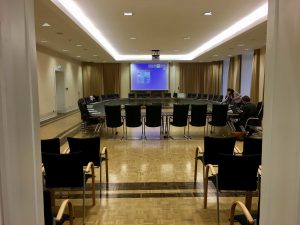
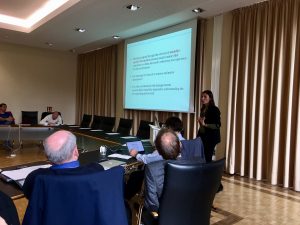
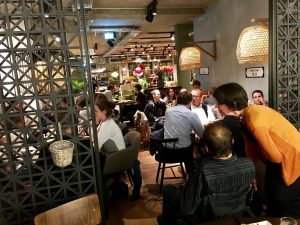
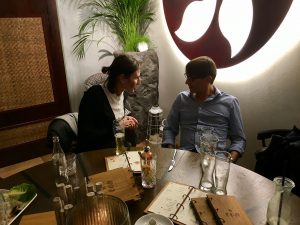
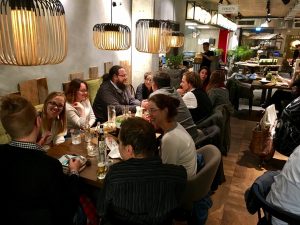
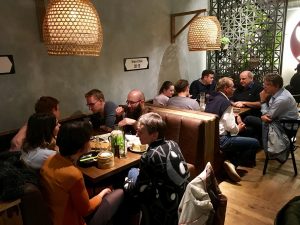
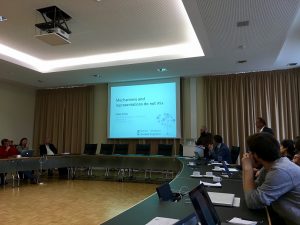
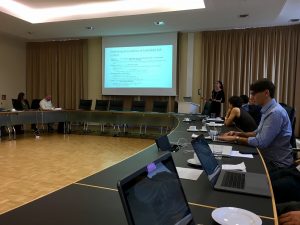
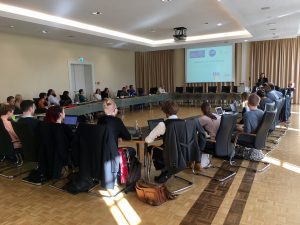
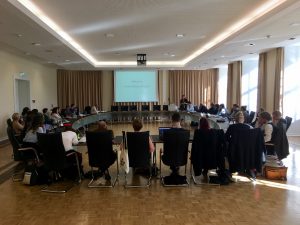
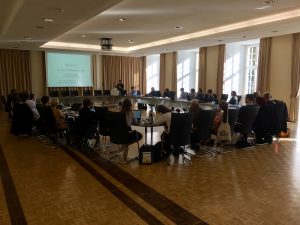
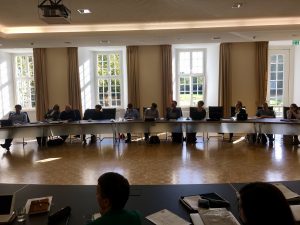
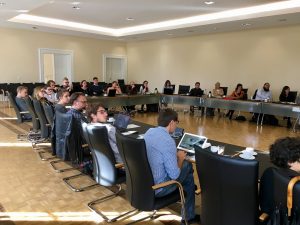
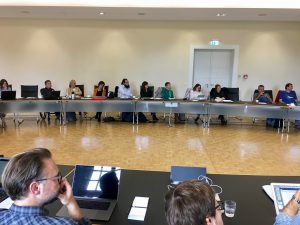
Second Internal RTG-Workshop
University of Osnabrück, Alter Senatssaal, 15/130, 02/14/2018, 10:30 – 17:15
| 10:30-11:45 | Guest Lecture |
Klaus Gramann: Human Neuroimaging – established artefacts and functional |
| 11:45-12:00 | Coffee Break | |
| 12:00-12:45 | PhD I |
Nico Kuske: Spatial Cognition and Sensory Augmentation in Enacted Theories of Cognition |
| 12:45-14:00 | Lunch Break | |
| 14:00-14:45 | PhD II | Lasse Bergmann: Affectively Situated Moral Cognition |
| 14:45-15:00 | Coffee Break | Robin Löhr: Abstract Concepts Are Not a Natural Kind |
| 15:00-15:45 | PhD III |
Dali Gamsakhurdashvili: Role of stress and sex hormones in emotional processing |
| 15:45-16:00 | Coffee Break | |
| 16:00-17:15 | PI Talk | Tobias Schlicht: Intentionality vs. Representation |
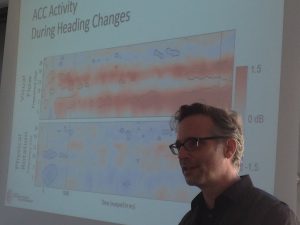
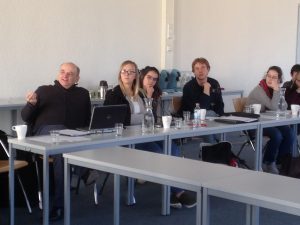
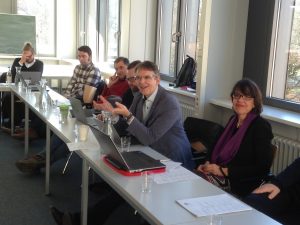
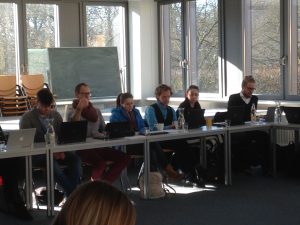
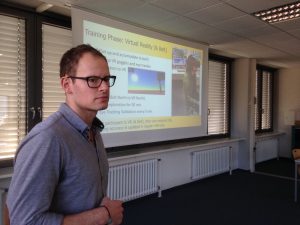
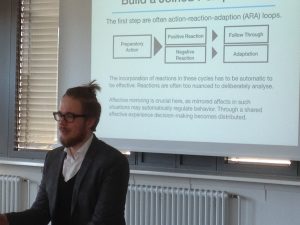
RTG Opening Workshop
June 23 2017, Ruhr University Bochum
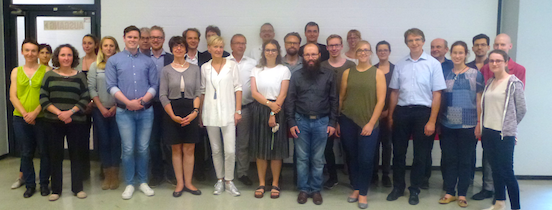
We are happy to report that the opening conference of the DFG research training group (RTG) “Situated Cognition”, held on June 23rd at Ruhr-University Bochum, was a complete success!
The conference was opened by the 12 PhD students, Benjamin Angerer, Lasse Bergmann, Samuel Cosper, Samantha Ehli, Dali Gamsakhurdashvili, Matej Kohar, Nicolas Kuske, Guido Robin Löhr, Jumana Morciglio, Julian Packheiser, Elmarie Venter, Julia Wolf, and the Post-Doc Dr. Beate Krickel. They presented the projects and introduced the key aspects of Situated Cognition. Thereby, an outlook on the work of the RTG for the next three years of research was provided.
The presentations were followed by three invited talks focusing on new empirical findings and theoretical challenges in the context of Situated Cognition.
Dr. Shirley-Ann Rueschemeyer from the University of York started off with her talk on “Perspective Taking during Communicative Acts”, in the course of which she presented her current collaborative research on the question in how far a listener’s understanding of a sentence is influenced by the presence of other listeners that have a different knowledge background. Her findings were striking: The presence of listeners with different contextual knowledge have an effect on the neural activations of the other listener. The so-called theory of mind system is driving activations in the flexible semantic system. So the presence of other listeners seem to alter the experience of words in different contexts.
In the second talk, Prof. Robert Rupert from Boulder University, Colorado, who is also the first fellow of the RTG, presented his approach to “Cognitive Systems and the Organism-based Continuity of the Self”. He addressed the highly debated issue of personal identity and challenged the neuroscientific view of the self, consisting only of a special kind of integrated collections of brain mechanisms, which are functionally characterized. He states that the self is not a psychological but a biological kind, constituted by a dynamic neural circuity, and that environmental influences do not lead to a different self.
The last talk was given by Prof. Peter König from Osnabrück University, who offered a deeper insight into the field of “Embodied Cognition”. According to his theory and studies, action is the key to cognition, for which the necessity of eye movements in the case of perception is a prime example. Furthermore, the results of his blind-spot study speak in favor of the predictive coding idea.
The day was completed by a joint dinner at Tapas restaurant in Bochum city which provided an excellent opportunity to continue discussions raised during the conference.
Top of page
GAP Satellite Workshop
Mental Representation, Mechanistic Explanation & Situated Cognition
Friday, September 21, 2018
University of Cologne
Seminargebäude, room S01
Universitätsstrasse 37, 50931 Cologne
The workshop brings together young researchers from the DFG-funded Graduiertenkolleg on “Situated Cognition” and experts working on issues concerning 4-E cognition. We will tackle central meta-questions as well as discuss core applications of 4E-approaches. Meta-questions that will be addressed in the workshop concern the nature and role of mental representations in cognitive processing, the causation/constitution distinction in accounts of extended cognition, and the compatibility of extended cognition and mechanistic explanation. As application cases, we will focus on the relevance of situatedness for social and moral cognition.
| 09:15-09:20 | Introduction | |
| 09:20-10:20 | Keynote talk | Louise Antony (Amherst): “Cartesian Materialism” |
| 10:20-11:00 | Matej Kohár (Bochum): “The role of covariance in mechanistic explanation of cognition” | |
| 11:00-11:30 | Coffee | |
| 11:30-12:30 | Keynote talk | Beate Krickel (Bochum): “The Causation/Constitution Distinction: Can the New Mechanistic Approach help?” |
| 12:30-14:00 | Lunch | |
| 14:00-15:00 | Keynote talk | Leon de Bruin (Nijmegen, Amsterdam): “Extended Cognition and the Limits of Mechanistic Explanation” |
| 15:00-15:40 | Jumana Morciglio (Osnabrück): “Putting the Mind Back Together: Reconceiving the Status of Emotions in Self-Control” | |
| 15:40-16:10 | Coffee | |
| 16:10-16:50 | Sabrina Coninx (Bochum): “Pain: Why representationalists cannot account for it” | |
| 16:50-17:50 | Keynote talk | Richard Menary (Maquarie): “Enculturating Cognition: From Simple Minds to Talking Heads and Back” |
Participation is free but space is limited. Please send us an email to register: rtg-situatedcognition@rub.de
For further information on GAP10, including directions, visit www.gap10.de.
The workshop has been a success! Here are some pictures:
